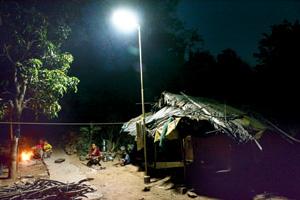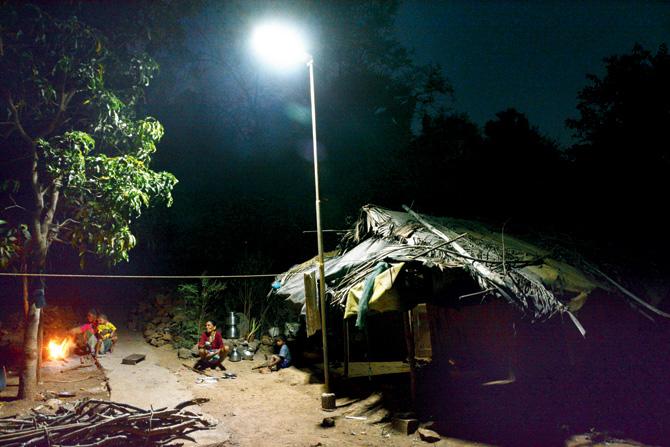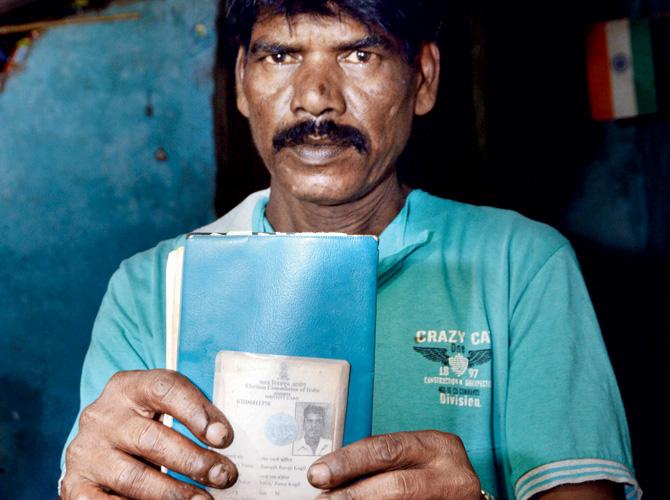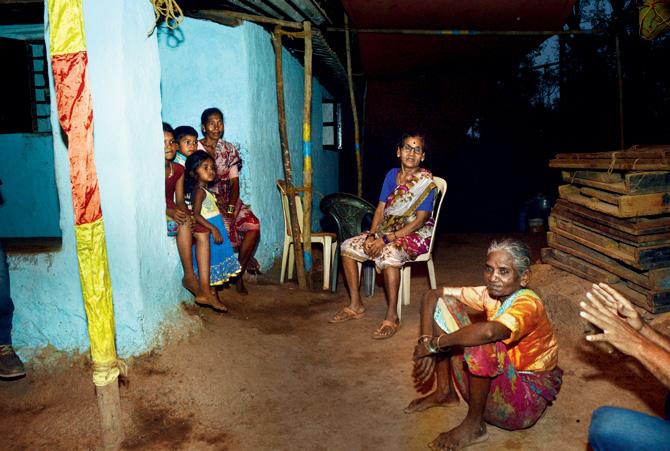In the first of a four-part series, we take a look at how PM Modi's electrifying promise is sadly caught in giant rolls of red tape

 Sunita Parale prepares dinner on a chulah under a solar powered light outside ehr house. An NGO put up these lights years ago. Pic/Satej SHinde
Sunita Parale prepares dinner on a chulah under a solar powered light outside ehr house. An NGO put up these lights years ago. Pic/Satej SHinde
ADVERTISEMENT
Three weeks ago, Prime Minister Narendra Modi caused a billion eyebrows to be raised when he announced that all villages in the country have been electrified. Just 20 km from Mumbai, every single one of the 400 homes in five tribal padas or villages in Gorai have yet to see the light, literally. Strangely, while the main road that passes outside the village has electricity poles, there is no official connection inside the homes of these tribals. Permissions have been stuck in a muddle of red tape for decades.
Gorai is connected to Mumbai via road (via Bhyander, through Uttan) as well as waterway (through Borivli). The waterway route is a 15-minute boat ride from the jetty, where one can even take one’s bike along. Once you reach the Gorai shore, one can either walk, take a bike or the government bus. It takes 40 minutes by bike to reach the tribal padas and then starts a dangerous trek through the hills. Gorai has five villages or padas — Jamdar Pada, Munda Pada, Babar Pada, Chotti Dongri and Mothi Dongri.
At Jamdar Pada
mid-day visited Jamdar Pada on Thursday night. It is hard to believe that the village is barely 20 km from Mumbai. Small huts, with a solar lamp post next to them, are a feature of this pada, which has 50-odd houses spread over a vast area. The solar lamp posts were apparently put up by an NGO, years ago.
“My grandfather and father died waiting for electricity to come to our pada after officials kept promising us that it would. It looks like I, too, will die without seeing my village electrified,” says Ramesh Kongil, 52, who is a fifth generation tribal of this village. He shows off his ration card and election card to prove his
village is not a minor blip on the city’s coastal map. He says the villagers have protested and written letters but they have been of no use as officials come to the village, conduct surveys and leave with hollow assurances.
Illegal connections
 Ramesh Kongil with his election card and ration card
Ramesh Kongil with his election card and ration card
There is a wedding coming up at Kongil’s house and he is forced to take an illegal connection for which he has to pay R500 a month. He also has to pay meter charges, which are too high for Kongil, who works as a labourer. Those in the village who have mobile phones, charge them when they are working outside or else pay R10 to someone in the government office to do the job, Kongil says.
Mani Lakshya, a relative of Kongil, who works in an old age home in the area, wonders why tribals in Thane have electricity and not Gorai, which is very much part of Mumbai. She says there is abject poverty in the area as the only work here is catching fish in the creek or hard labour. Kamla (who only gave her first name), an old woman who cannot even remember her age, says for several generations this has been the problem here and the village children haven’t been able to study properly because of this. The village has no school and children have to travel far to attend one. Most people here have studied only up to Std IX.
 Kongil says his father died waiting for electricity, his family has had to take illegal power connection that he can ill-afford because of a wedding
Kongil says his father died waiting for electricity, his family has had to take illegal power connection that he can ill-afford because of a wedding
“Also, we can’t even sleep outside in the unbearable summer heat because of the acute mosquito menace and the danger of wild animals,” Kamla says, even as we swat bloodsucking insects on our arms.
There have been cases of snake bites in the night, in which children have even died as arranging for a boat to take the child to Shatabdi Hospital is time-consuming. However, the boats or jetties stop operations by 11 pm. The only hospital in the area shuts early and hence if anything happens at night, the tribals are forced to go to Borivli.
While there are solar power poles in the village, the problem is that they do not work during the monsoon.
Corporator says
Former corporator Shivanand Shetty shows us a thick file of letters to various offices that he has written since 2013 requesting for electricity for these tribals. He claims the collector has assured a solution soon but as of now, the tribals continue to wait.
Reliance says
Satish Sawant, sub-station officer of Reliance Energy, says, “The land here belongs to the collector and till the time we do not get a no-objection certificate (NOC) from them, we cannot give electricity to these padas. Politicians, too, have raised the issue and supported the locals, but in this case, the last word is the collector’s. We have done a survey and most of the groundwork but have to wait for the collector’s nod.”
Govt says
As per the Union power ministry’s definition, a village is said to be electrified if at least 10% of the households in it have power connections, and if electricity is provided in public places such as schools, health centres and community centres.
Catch up on all the latest Crime, National, International and Hatke news here. Also download the new mid-day Android and iOS apps to get latest updates
 Subscribe today by clicking the link and stay updated with the latest news!" Click here!
Subscribe today by clicking the link and stay updated with the latest news!" Click here!







